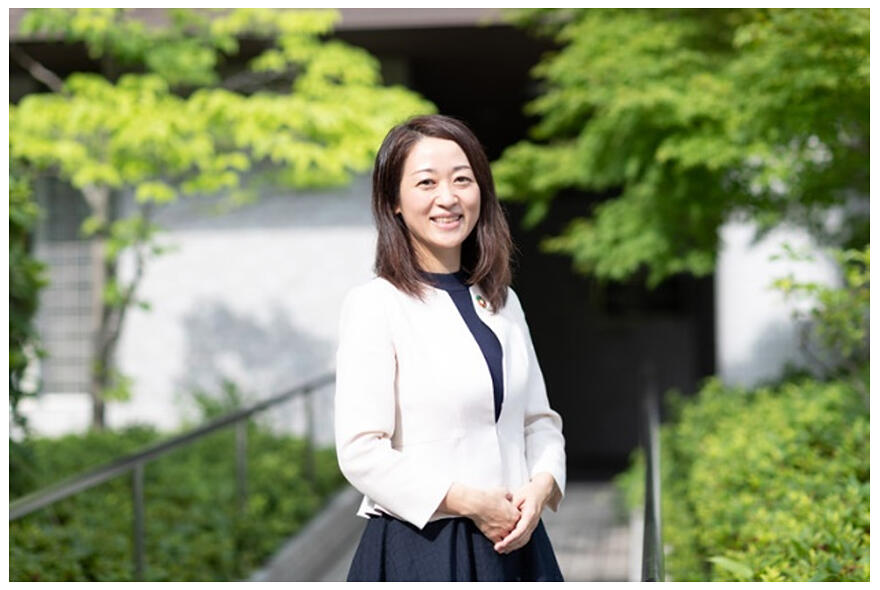
Behind Japan's rapidly declining birthrates and aging population, there is little positive information about childbirth and childcare, and there is a lingering, old-fashioned understanding of the gender roles of men and women. After graduating from a Japanese university, Yoko Shimpuku obtained her doctorate in the United States, devoted herself to supporting pregnancy and childbirth in Tanzania as an expert in midwifery, and then became a professor at Hiroshima University. According to her, although the environment and conditions in both Japan and Tanzania are very different, in both countries providing appropriate information for positive childbirth leads to the well-being of both individuals and society.
Birth rates are not recovering, partly due to negative information
According to the Monthly Vital Statistics Reports released by Japan's Ministry of Health, Labour and Welfare, in 2020 there were 840,835 births, but in 2021 the number of births decreased by nearly 30,000 to 811,604. The highest-ever number of births in Japan was 2,6996,638 in 1949, and the number of births has now fallen to around just 30% of that.
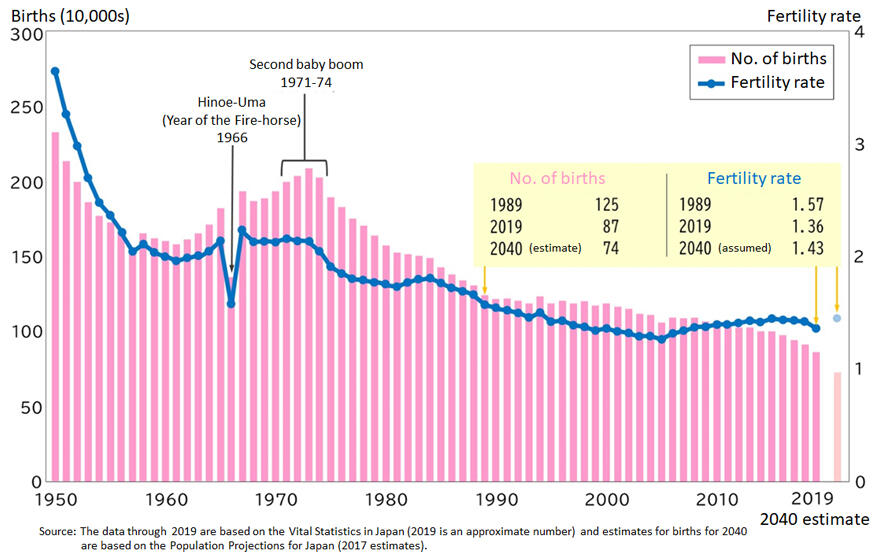
(sourced from the Ministry of Health, Labour and Welfare statistics and translated by JST)
Additionally, Japan's total fertility rate, which is the average number of children a woman will give birth to in her lifetime, dropped to 1.34 in 2020. It has also been reported that the total fertility rate in the Philippines plummeted from 2.7 to 1.8 in the five years since 2016. A common issue across countries seems to be that the number of children is declining due to the increasing cost of children's education as people's lives become more affluent, rising medical standards and falling child mortality rates, and the advancement of women in society and the lack of social support for raising children.
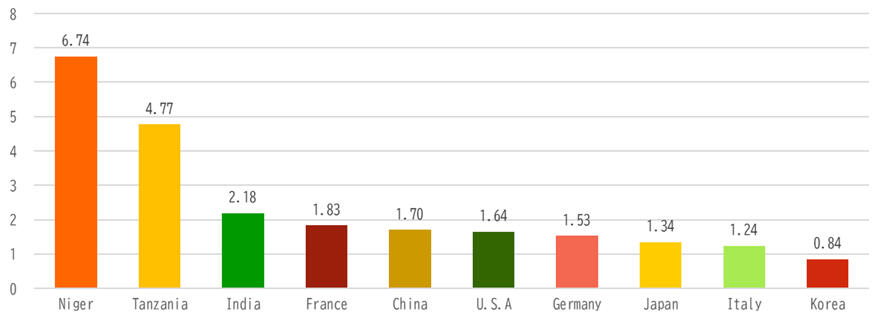
(sourced from the World Bank data, 2020)
A 2009 article in the journal Nature stated that the fertility rate in a country tends to recover when the country's development exceeds a certain level. Japan, however, is one of the exceptions to this, where the number of births has continued to decline despite the need for improvement, with a wide range of measures being required, including labor market flexibility and improvements to both social security and individual welfare.
Shimpuku is familiar with the situation in countries around the world and said that "For Japan, in addition to the lack of social support, another factor may be the spread of negative information about childbirth and childcare through social media. Raising a child is fun, it opens a new world to parents, and I feel that it has led to my own growth. Although the systems to support pregnancy and childbirth, such as the 2022 revisions to the "Act on Childcare Leave, Caregiver Leave, and Other Measures for the Welfare of Workers Caring for Children or Other Family Members", provide more support than in the past, it appears that such positive information is not really being disseminated."
Supporting pregnancy and childbirth in Tanzania
For more than 10 years since 2008, Shimpuku has been working to support the pregnancies and childbirths of Tanzanian women. In recognition of her diverse efforts, in 2020 the World Health Organization (WHO) selected her as one of its "100+ Outstanding Women Nurses and Midwives."
In Tanzania there is a wide disparity in medical care between urban and rural areas, and in rural areas only about half of pregnant women give birth in hospitals, and many of them do not receive adequate support. "In Tanzania, the percentage of mothers who died in childbirth was more than 100 times higher than in Japan. Most of those deaths are preventable with a good health care system."

(sourced from UNICEF's "The State of the World's Children 2021")
Believing that a lack of necessary information was the cause, Shimpuku turned her attention to smartphones, which are rapidly spreading in Tanzania. "In the past, I used to travel around the country with picture cards, but I realized that, if I developed an app, then I would be able to convey the information to a lot of people at once and that it would be okay even if I'm in Japan." So, in 2021, she began an app for midwives that was jointly developed with Castalia Co., Ltd. (in Minato-City, Tokyo). The content of the app is centered around the WHO's recommendations on "Intrapartum care for a positive childbirth experience," but Shimpuku has arranged the information so that anyone can enjoy learning about it.
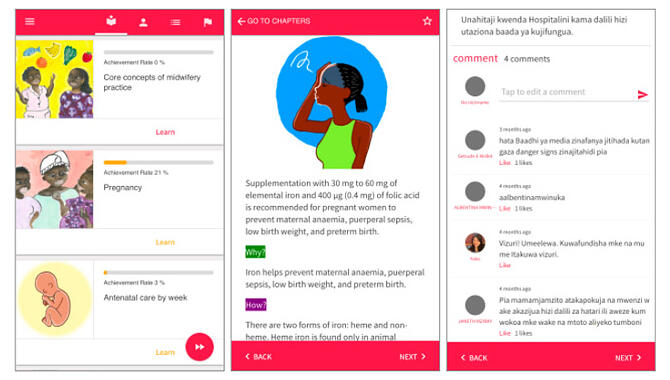
(provided by Yoko Shimpuku)
Next, she worked on an app for expectant and nursing mothers. It covers the contents of the Maternal and Child Health Handbook used in Japan and provides information such as when to go for checkups and vaccinations. According to Shimpuku, "A professional midwife will answer if someone asks a question, and it also has the advantage of creating a community among expectant and nursing mothers."
In Tanzania there are also many girls who unintentionally become pregnant due to poverty. In response to this issue, Shimpuku participates in the Japan International Cooperation Agency (JICA)'s grass roots technical assistance projects and devotes herself to educational activities for boys, girls, teachers, and general adults.
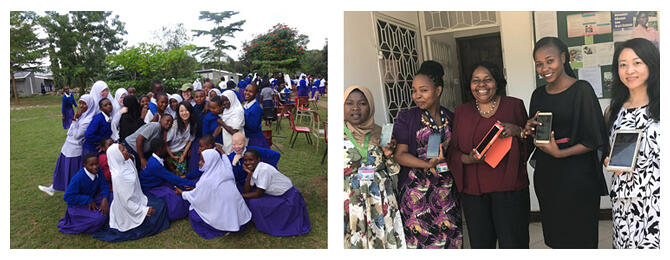
(provided by Yoko Shimpuku)
The situation will not improve overnight, of course, but the results are gradually starting to be seen. For example, individuals who have completed a master's degree in midwifery, a program that Mrs. Shimpuku played a central role in establishing, are now working as head midwives and as nursing directors at hospitals across the country.
Incidentally, Tanzanian midwives and nurses are said to be about evenly split between men and women. Shimpuku pointed out, "Being a nurse or a midwife is not a women's profession in every country. It is not possible to make general comparisons because the content of the care that is provided overseas and the wages are different. However, I think there is an unconscious bias if there is a belief that men can't provide good care."
Not being limited by gender roles
As for unconscious bias in Japan, in 2021 the Gender Equality Bureau in the Cabinet Office conducted a research study on unconscious beliefs (unconscious biases) due to gender. The results showed that only a small number of people have an awareness that roles differ according to gender.

(sourced from a survey by the Gender Equality Bureau Cabinet Office and translated by JST)
For example, more than 30% of both men and women think that "Women shouldn't be assigned important tasks when pregnant." If this kind of attitude permeates a workplace, then women will feel uneasy about their future career and will hesitate to take steps towards giving birth, even if they want to. For men as well, there are disadvantages in that it is difficult for them to spend time with their children because they are tied to the workplace, and, in addition, this unconscious bias will be passed on to the next generation if only women are involved in childcare.
The government has launched numerous measures to overcome this situation. In 2022 there were revisions to the "Act on Childcare Leave, Caregiver Leave, and Other Measures for the Welfare of Workers Caring for Children or Other Family Members, and large companies with more than 1,000 employees are now required to disclose the rate at which male employees take parental leave.
In terms of safety, Japan ranks among the best in the world, with extremely low figures for neonatal morality, infant mortality, and maternal mortality. Shimpuku said that "I am proud to be involved in pregnancy and childbirth."
However, it can't really be said that such information is widely distributed in society as a whole. "It's a waste that there are so few people who hear about this because of the lack of outreach efforts. Because of that, I would like to see positive stories like this one, published in various places."
Initiatives in women's health lag behind
Shimpuku herself is a mother of one and is working on childcare together with her husband from Tanzania, and says that she became aware of issues through her own childbirth experience. Morning sickness early in her pregnancy was quite severe, but, when she looked into it, she found that there was almost no research in the world on the issue. Shimpuku's view is that "This may be because there have been few researchers who have experienced pregnancy and childbirth and who are interested in this research area."
This problem is similar to that of menstrual cramps, where research has not advanced, and it cannot be said that there is sufficient understanding and consideration of the issue at workplaces and schools. "In the future, we need to make further progress on research into women's health, which is lagging behind. It is also important to create an environment where people with very painful symptoms can say so without hesitation and take time off."
Improving the unstable positions of young researchers
Shimpuku experienced pregnancy and childbirth after having become a professor, and now, looking back, said that "It took me a long time to recover physically, so I wished that I had given birth sooner." However, through this background of giving birth late, there is also a glimpse of the current situation for many young researchers in Japan, both men and women, who are put in unstable work positions with a fixed term.
With this is mind, Shimpuku is currently serving as a Vice President for the Young Academy of Japan (an organization under the Science Council of Japan) and as a temporary member of the Academic Subcommittee of the Council for Science and Technology. "If you consider a person's long life, then a delay of a year or two in a job from taking parental leave can be made up for later. However, we must arrange a mechanism so that this gap in a job can be made up for, even if they are delayed. It is important to take a long-term view of the situation, such as considering the situation even for fixed-term jobs and allowing them to be renewed if a certain level of results are achieved with the period."
There are still no signs of improvements in the declining birthrate, but the situation is steadily improving thanks to the efforts of working women and those who support them. This kind of situation isn't just unique to Japan, and, just like how Shimpuku incorporated the WHO's recommendations on "Intrapartum care for a positive childbirth experience" into an app in Tanzania, efforts are being made around the world to realize childbirth according to each individual's desires. According to Shimpuku, "From now on, society will gradually change into a world where people can choose to live in a variety of ways."
Therefore, there is no need to be bound by negative information or preconceived notions. Looking to the future, she says that, "Young people don't think that the present is all that there is, and those who are willing to find something new should take on more challenges."
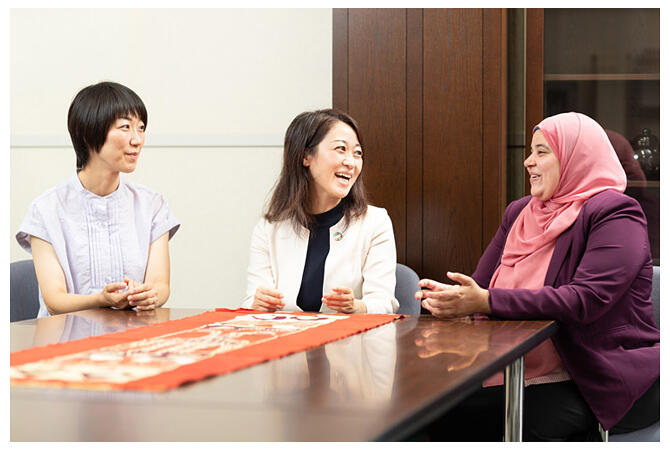
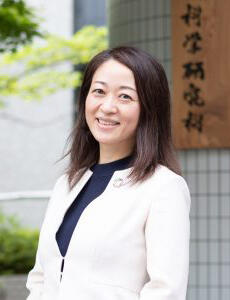
Profile
SHIMPUKU Yoko
Vice President (International Public Relations) and Professor, Graduate School of Biomedical and Health Sciences, Hiroshima University
After graduating from St. Luke's College of Nursing (at the time), she worked as a midwife and completed graduate studies at the University of Illinois Chicago Graduate School of Nursing (Ph.D) After working as an assistant professor at St. Luke's International University and an associate professor at Kyoto University Graduate School of Medicine, Family Nursing research, Division of Human Health Sciences, she assumed her current position as a professor in 2020 and became Vice President (International Public Relations) in 2022.
Original article was provided by the Science Portal and has been translated by Science Japan.




